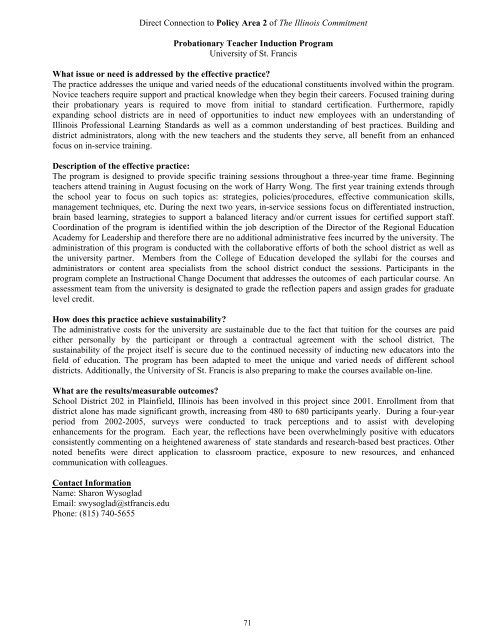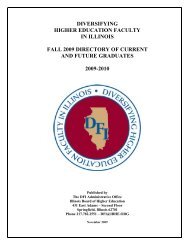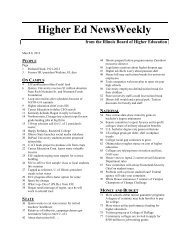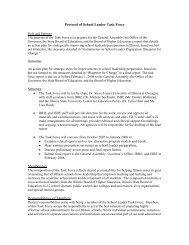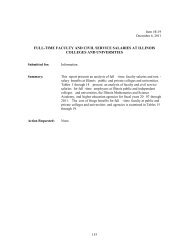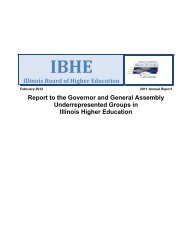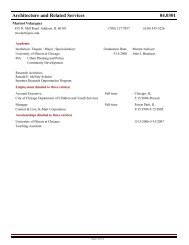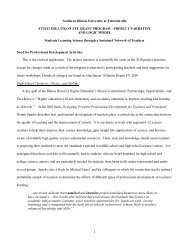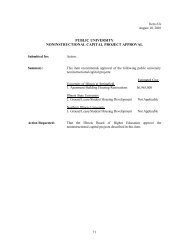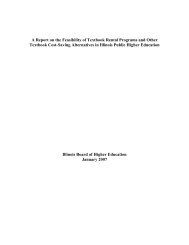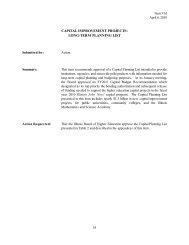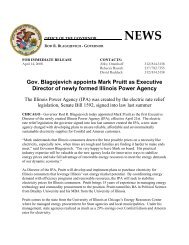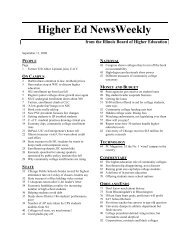Title of Effective Practice: - California Postsecondary Education ...
Title of Effective Practice: - California Postsecondary Education ...
Title of Effective Practice: - California Postsecondary Education ...
Create successful ePaper yourself
Turn your PDF publications into a flip-book with our unique Google optimized e-Paper software.
Direct Connection to Policy Area 2 <strong>of</strong> The Illinois Commitment<br />
Probationary Teacher Induction Program<br />
University <strong>of</strong> St. Francis<br />
What issue or need is addressed by the effective practice?<br />
The practice addresses the unique and varied needs <strong>of</strong> the educational constituents involved within the program.<br />
Novice teachers require support and practical knowledge when they begin their careers. Focused training during<br />
their probationary years is required to move from initial to standard certification. Furthermore, rapidly<br />
expanding school districts are in need <strong>of</strong> opportunities to induct new employees with an understanding <strong>of</strong><br />
Illinois Pr<strong>of</strong>essional Learning Standards as well as a common understanding <strong>of</strong> best practices. Building and<br />
district administrators, along with the new teachers and the students they serve, all benefit from an enhanced<br />
focus on in-service training.<br />
Description <strong>of</strong> the effective practice:<br />
The program is designed to provide specific training sessions throughout a three-year time frame. Beginning<br />
teachers attend training in August focusing on the work <strong>of</strong> Harry Wong. The first year training extends through<br />
the school year to focus on such topics as: strategies, policies/procedures, effective communication skills,<br />
management techniques, etc. During the next two years, in-service sessions focus on differentiated instruction,<br />
brain based learning, strategies to support a balanced literacy and/or current issues for certified support staff.<br />
Coordination <strong>of</strong> the program is identified within the job description <strong>of</strong> the Director <strong>of</strong> the Regional <strong>Education</strong><br />
Academy for Leadership and therefore there are no additional administrative fees incurred by the university. The<br />
administration <strong>of</strong> this program is conducted with the collaborative efforts <strong>of</strong> both the school district as well as<br />
the university partner. Members from the College <strong>of</strong> <strong>Education</strong> developed the syllabi for the courses and<br />
administrators or content area specialists from the school district conduct the sessions. Participants in the<br />
program complete an Instructional Change Document that addresses the outcomes <strong>of</strong> each particular course. An<br />
assessment team from the university is designated to grade the reflection papers and assign grades for graduate<br />
level credit.<br />
How does this practice achieve sustainability?<br />
The administrative costs for the university are sustainable due to the fact that tuition for the courses are paid<br />
either personally by the participant or through a contractual agreement with the school district. The<br />
sustainability <strong>of</strong> the project itself is secure due to the continued necessity <strong>of</strong> inducting new educators into the<br />
field <strong>of</strong> education. The program has been adapted to meet the unique and varied needs <strong>of</strong> different school<br />
districts. Additionally, the University <strong>of</strong> St. Francis is also preparing to make the courses available on-line.<br />
What are the results/measurable outcomes?<br />
School District 202 in Plainfield, Illinois has been involved in this project since 2001. Enrollment from that<br />
district alone has made significant growth, increasing from 480 to 680 participants yearly. During a four-year<br />
period from 2002-2005, surveys were conducted to track perceptions and to assist with developing<br />
enhancements for the program. Each year, the reflections have been overwhelmingly positive with educators<br />
consistently commenting on a heightened awareness <strong>of</strong> state standards and research-based best practices. Other<br />
noted benefits were direct application to classroom practice, exposure to new resources, and enhanced<br />
communication with colleagues.<br />
Contact Information<br />
Name: Sharon Wysoglad<br />
Email: swysoglad@stfrancis.edu<br />
Phone: (815) 740-5655<br />
71


